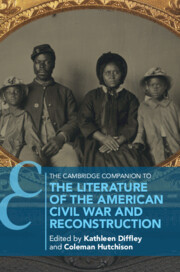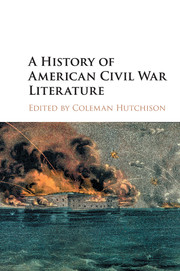31 results
Chapter 14 - Little Postage Stamps
- from Part III - People and Places
-
-
- Book:
- The Cambridge Companion to the American Short Story
- Published online:
- 11 May 2023
- Print publication:
- 25 May 2023, pp 221-235
-
- Chapter
- Export citation
Chronology
-
- Book:
- The Cambridge Companion to the Literature of the American Civil War and Reconstruction
- Published online:
- 04 August 2022
- Print publication:
- 18 August 2022, pp xxi-xxiv
-
- Chapter
- Export citation
Introduction
-
-
- Book:
- The Cambridge Companion to the Literature of the American Civil War and Reconstruction
- Published online:
- 04 August 2022
- Print publication:
- 18 August 2022, pp 1-12
-
- Chapter
- Export citation
Contents
-
- Book:
- The Cambridge Companion to the Literature of the American Civil War and Reconstruction
- Published online:
- 04 August 2022
- Print publication:
- 18 August 2022, pp vii-x
-
- Chapter
- Export citation
Index
-
- Book:
- The Cambridge Companion to the Literature of the American Civil War and Reconstruction
- Published online:
- 04 August 2022
- Print publication:
- 18 August 2022, pp 315-320
-
- Chapter
- Export citation
Part II - Worlds Made and Remade
-
- Book:
- The Cambridge Companion to the Literature of the American Civil War and Reconstruction
- Published online:
- 04 August 2022
- Print publication:
- 18 August 2022, pp 167-310
-
- Chapter
- Export citation
Suggestions for Further Reading
-
- Book:
- The Cambridge Companion to the Literature of the American Civil War and Reconstruction
- Published online:
- 04 August 2022
- Print publication:
- 18 August 2022, pp 311-314
-
- Chapter
- Export citation
Copyright page
-
- Book:
- The Cambridge Companion to the Literature of the American Civil War and Reconstruction
- Published online:
- 04 August 2022
- Print publication:
- 18 August 2022, pp iv-iv
-
- Chapter
- Export citation
Acknowledgments
-
- Book:
- The Cambridge Companion to the Literature of the American Civil War and Reconstruction
- Published online:
- 04 August 2022
- Print publication:
- 18 August 2022, pp xix-xx
-
- Chapter
- Export citation
Dedication
-
- Book:
- The Cambridge Companion to the Literature of the American Civil War and Reconstruction
- Published online:
- 04 August 2022
- Print publication:
- 18 August 2022, pp v-vi
-
- Chapter
- Export citation
Contributors
-
- Book:
- The Cambridge Companion to the Literature of the American Civil War and Reconstruction
- Published online:
- 04 August 2022
- Print publication:
- 18 August 2022, pp xiii-xviii
-
- Chapter
- Export citation
Part I - The Blind Ruck of Event
-
- Book:
- The Cambridge Companion to the Literature of the American Civil War and Reconstruction
- Published online:
- 04 August 2022
- Print publication:
- 18 August 2022, pp 13-166
-
- Chapter
- Export citation
Figures
-
- Book:
- The Cambridge Companion to the Literature of the American Civil War and Reconstruction
- Published online:
- 04 August 2022
- Print publication:
- 18 August 2022, pp xi-xii
-
- Chapter
- Export citation

The Cambridge Companion to the Literature of the American Civil War and Reconstruction
-
- Published online:
- 04 August 2022
- Print publication:
- 18 August 2022
Contents
-
- Book:
- A History of American Civil War Literature
- Published online:
- 05 December 2015
- Print publication:
- 01 December 2015, pp vii-viii
-
- Chapter
- Export citation
Recommendations for Further Reading
-
- Book:
- A History of American Civil War Literature
- Published online:
- 05 December 2015
- Print publication:
- 01 December 2015, pp 343-348
-
- Chapter
- Export citation

A History of American Civil War Literature
-
- Published online:
- 05 December 2015
- Print publication:
- 01 December 2015
Part III - Figures
-
- Book:
- A History of American Civil War Literature
- Published online:
- 05 December 2015
- Print publication:
- 01 December 2015, pp 179-180
-
- Chapter
- Export citation
Part II - Genres
-
- Book:
- A History of American Civil War Literature
- Published online:
- 05 December 2015
- Print publication:
- 01 December 2015, pp 77-78
-
- Chapter
- Export citation
Frontmatter
-
- Book:
- A History of American Civil War Literature
- Published online:
- 05 December 2015
- Print publication:
- 01 December 2015, pp i-iv
-
- Chapter
- Export citation



